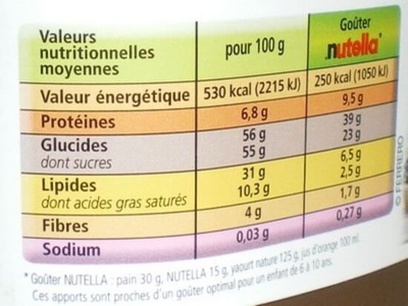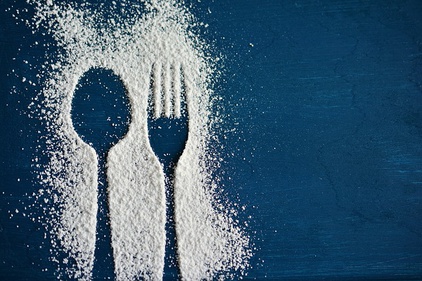Le sucre est absolument partout, quel que soit l’aliment qu’on consomme, on y trouve du sucre sous une forme ou une autre. Donnez-vous la peine de lire les étiquettes pendant vos courses et vous serez surpris de remarquer que les industriels rajoutent du sucre vraiment partout : sucre raffiné, sucre de canne ou même fructose, glucose, sirop de glucose, maltose et tant d’autres. Un poison après l’autre, nos aliments de la grande consommation sont enrichis en sucre d’une façon ou d’une autre.

Apprendre à déceler les différents sucres ajoutés sur les étiquettes est une priorité dans nos habitudes de vie saine.
Nos consommations ont augmenté également, nous sommes tous devenus des intoxiqués au sucre et les statistiques le prouvent. En France, la consommation de sucre annuelle en 1800 était de 5 kilos par an ; aujourd’hui nous avoisinons les 35 kilos par an et par personne (et 46 kilos en Belgique). Ce chiffre est affolant et il fait réellement peur pour l’avenir de notre santé.
Doit-on supprimer tous les sucres de notre assiette ?
Absolument pas ! Les sucres sont indispensables à la bonne santé de notre organisme et principalement de notre cerveau dont les cellules ne se nourrissent que de glucides. Reste à en consommer d’une manière consciente et réfléchie : les sucres lents et naturels issus des végétaux sont essentiels à notre bon fonctionnement, ils sont notre carburant. Ne les condamnons pas !
Les sucres à supprimer sont sans conteste les sucres raffinés, ajoutés et transformés. Ceux-ci sont de réels poisons qui encrassent notre organisme et nous intoxiquent totalement. Ils sont de plus addictifs et les effets pourraient être comparés à ceux d’une drogue dure.

Le sucre blanc raffiné qui n’est autre que le Saccharose, extrait de la betterave, est chimiquement constitué d’une molécule de fructose liée à une molécule de glucose. Ce type de sucre est celui que l’on trouve malheureusement dans de nombreux placards, dans les restaurants, les cafés, celui qui est utilisé par la majorité des personnes, qui est utilisé par les grands boulangers, les chefs étoilés mais aussi par la ménagère du 20e siècle. Il est pourtant à abolir. Contrairement aux sucres favorables à notre bon fonctionnement, le saccharose, après être passé entre les mains des industriels qui vont le transformer, le raffiner, le blanchir, n’a plus aucune qualité nutritionnelle pour nous faire avancer dans la vie.
Quels sont les risques à la consommation de sucre blanc raffiné ?
Ce type de sucre, comme tout autre sucre rapide d’ailleurs, favorise la prolifération de champignons et celui mis en avant n’est autre que le Candida Albicans.
- Lorsque le glucose est mal absorbé par les cellules, il se concentre dans le sang, dérègle la sécrétion d’insuline et cette maladie bien connue de tous n’est autre que le diabète qu’on rencontre d’ailleurs de plus en plus et chez les enfants de plus en plus jeunes.
- L’excès de saccharose provoque une carence en vitamines B. Groupe de vitamines indispensables au bon fonctionnement du système nerveux. N’hésitez pas à vous complémenter en vitamines si vous consommez trop d’aliments composés de ce type de sucre.
- Le sucre est cariogène et donc amène plus rapidement des caries.
- Une prise de poids certaine et une tendance à l’obésité.
- L’hypo et l’hyperglycémie
- Enfin, ce sucre est acidifiant et qui dit acidification du terrain dit maladie.
Si le sucre des fruits est bon, je peux dès lors consommer du fructose ?
Bien que les fruits soient principalement composés de fructose et qu’ils soient indispensables au bon fonctionnement organique. La consommation abusive de fructose – donc en remplacement du glucose par exemple – n’est pas envisageable dans une alimentation saine. En effet, des études prouvent que l’abus de fructose aurait des conséquences sur le taux de triglycérides dans le sang et donc il serait un facteur de risques pour les maladies cardiovasculaires. Contentez-vous dès lors du fructose qui se trouvent dans les fruits et non le fructose ajouté disponible dans le réseau industriel aujourd’hui. En bref, ne consommez aucun sucre que vous ne pourrez trouver tel quel dans la nature, nous n’avons pas été programmés pour consommer ce genre de produit chimique et transformé. Une pomme, une date, une mangue…rien de tel pour un apport nutritionnel et énergétique sain.



